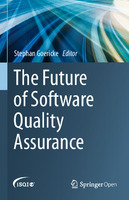The Future of Software Quality Assurance
Contributor(s)
Goericke, Stephan (editor)
Language
EnglishAbstract
This open access book, published to mark the 15th anniversary of the International Software Quality Institute (iSQI), is intended to raise the profile of software testers and their profession. It gathers contributions by respected software testing experts in order to highlight the state of the art as well as future challenges and trends. In addition, it covers current and emerging technologies like test automation, DevOps, and artificial intelligence methodologies used for software testing, before taking a look into the future. The contributing authors answer questions like: "How is the profession of tester currently changing? What should testers be prepared for in the years to come, and what skills will the next generation need? What opportunities are available for further training today? What will testing look like in an agile world that is user-centered and fast-paced? What tasks will remain for testers once the most important processes are automated?" iSQI has been focused on the education and certification of software testers for fifteen years now, and in the process has contributed to improving the quality of software in many areas. The papers gathered here clearly reflect the numerous ways in which software quality assurance can play a critical role in various areas. Accordingly, the book will be of interest to both professional software testers and managers working in software testing or software quality assurance.
Keywords
Computer science; Software engineering; Management information systems; Management information systems; Computer scienceDOI
10.1007/978-3-030-29509-7Publisher
Springer NaturePublisher website
https://www.springernature.com/gp/products/booksPublication date and place
Cham, 2020Classification
Business mathematics and systems
Software Engineering
Information architecture


 Download
Download Web Shop
Web Shop